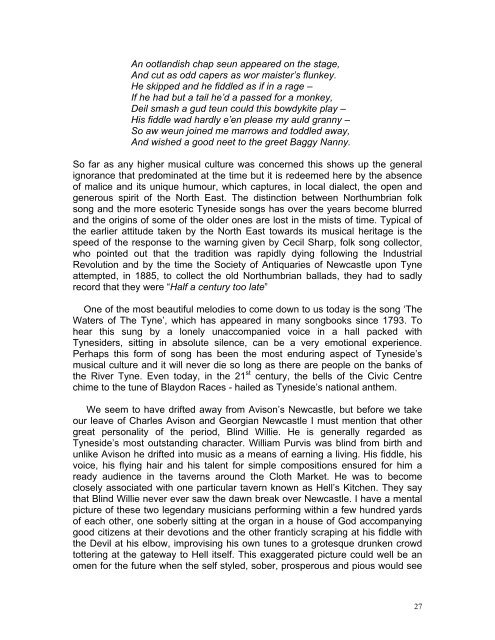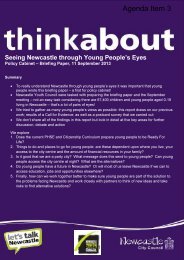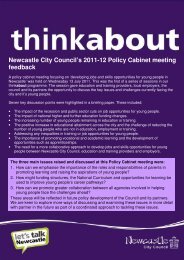NEWCASTLE'S MUSICAL HERITAGE AN INTRODUCTION By ...
NEWCASTLE'S MUSICAL HERITAGE AN INTRODUCTION By ...
NEWCASTLE'S MUSICAL HERITAGE AN INTRODUCTION By ...
You also want an ePaper? Increase the reach of your titles
YUMPU automatically turns print PDFs into web optimized ePapers that Google loves.
An ootlandish chap seun appeared on the stage,<br />
And cut as odd capers as wor maister’s flunkey.<br />
He skipped and he fiddled as if in a rage –<br />
If he had but a tail he’d a passed for a monkey,<br />
Deil smash a gud teun could this bowdykite play –<br />
His fiddle wad hardly e’en please my auld granny –<br />
So aw weun joined me marrows and toddled away,<br />
And wished a good neet to the greet Baggy Nanny.<br />
So far as any higher musical culture was concerned this shows up the general<br />
ignorance that predominated at the time but it is redeemed here by the absence<br />
of malice and its unique humour, which captures, in local dialect, the open and<br />
generous spirit of the North East. The distinction between Northumbrian folk<br />
song and the more esoteric Tyneside songs has over the years become blurred<br />
and the origins of some of the older ones are lost in the mists of time. Typical of<br />
the earlier attitude taken by the North East towards its musical heritage is the<br />
speed of the response to the warning given by Cecil Sharp, folk song collector,<br />
who pointed out that the tradition was rapidly dying following the Industrial<br />
Revolution and by the time the Society of Antiquaries of Newcastle upon Tyne<br />
attempted, in 1885, to collect the old Northumbrian ballads, they had to sadly<br />
record that they were “Half a century too late”<br />
One of the most beautiful melodies to come down to us today is the song ‘The<br />
Waters of The Tyne’, which has appeared in many songbooks since 1793. To<br />
hear this sung by a lonely unaccompanied voice in a hall packed with<br />
Tynesiders, sitting in absolute silence, can be a very emotional experience.<br />
Perhaps this form of song has been the most enduring aspect of Tyneside’s<br />
musical culture and it will never die so long as there are people on the banks of<br />
the River Tyne. Even today, in the 21 st century, the bells of the Civic Centre<br />
chime to the tune of Blaydon Races - hailed as Tyneside’s national anthem.<br />
We seem to have drifted away from Avison’s Newcastle, but before we take<br />
our leave of Charles Avison and Georgian Newcastle I must mention that other<br />
great personality of the period, Blind Willie. He is generally regarded as<br />
Tyneside’s most outstanding character. William Purvis was blind from birth and<br />
unlike Avison he drifted into music as a means of earning a living. His fiddle, his<br />
voice, his flying hair and his talent for simple compositions ensured for him a<br />
ready audience in the taverns around the Cloth Market. He was to become<br />
closely associated with one particular tavern known as Hell’s Kitchen. They say<br />
that Blind Willie never ever saw the dawn break over Newcastle. I have a mental<br />
picture of these two legendary musicians performing within a few hundred yards<br />
of each other, one soberly sitting at the organ in a house of God accompanying<br />
good citizens at their devotions and the other franticly scraping at his fiddle with<br />
the Devil at his elbow, improvising his own tunes to a grotesque drunken crowd<br />
tottering at the gateway to Hell itself. This exaggerated picture could well be an<br />
omen for the future when the self styled, sober, prosperous and pious would see<br />
27

















